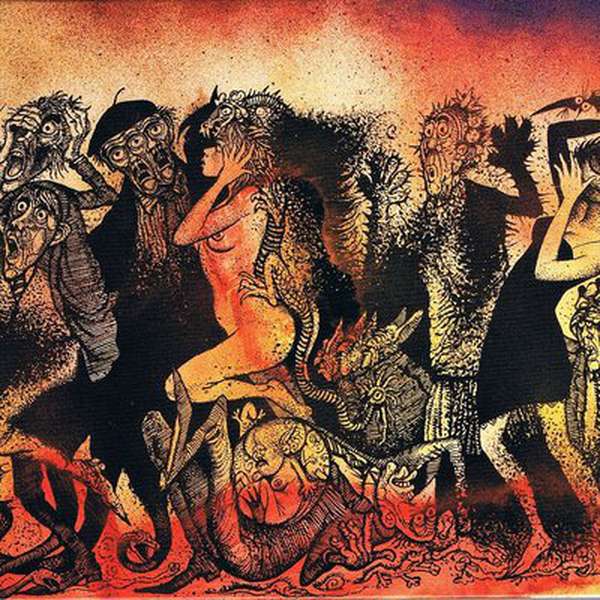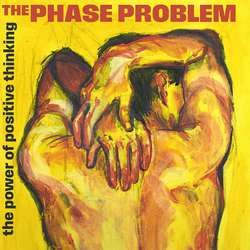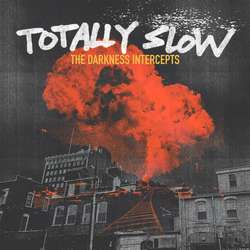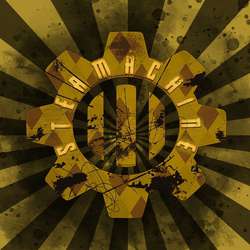Steven Wilson and Mikael Åkerfeldt are both two musicians I hold in incredibly high esteem. Wilson’s flabbergasting diversity of styles covered with Porcupine Tree or his various solo projects and Åkerfeldt’s amazingly thoughtful and moving compositions with Opeth both continue to astound me no matter how often I listen to them. It should go without saying they are both gifted musicians of the highest calibre. It also turns out that they’re both huge fans of each others’ work, which led to their collaborative project Storm Corrosion, who released their self-titled debut in 2012.
So what exactly happens when you take the two of them, throw them in a room, and have them write music together? If you were expecting merely some progressive rock supergroup, then you’d be about as far off the mark as you could possibly get. I wouldn’t blame anyone for having that impression, either; the album was prominently described by Opeth’s Facebook page as “the final part in the odd trilogy of records completed by Heritage and…Grace for Drowning”. This actually set my expectations for Storm Corrosion incredibly low, because I scarcely cared for either of those albums. On one hand, Heritage was an interesting embellishment and exploration of Opeth’s style, to be certain, but didn’t have any real material of substance in it. And Grace for Drowning, on the other hand, was just more of the exact same stuff we’ve heard from Wilson’s various projects before, if just a little less inspired. I was pondering pretty seriously how two decidedly mediocre albums could possibly lead up to anything of worth.
The most noticeable thing about this album is how incredibly soft it is, and I don’t mean that stylistically. I hope you’re not going to try and listen to this album anywhere louder than a public library, because these guys have as delicate dynamics as Godspeed You! Black Emperor, except somehow even quieter. To say this album puts the “-issimo” in “pianissimo” would be an understatement, and on the few occasions where the music does venture up into mezzo forte territory, it certainly doesn’t stay there very long. You’ll need to be paying very close attention to this album to hear what’s going on.
In some ways, that plays in heavily to the dark folk music influence that is so prominent in Mikael Åkerfeldt’s other works. “Drag Ropes”, for example, utilizes that particular variety of twisted storytelling set to folk melodies that is characteristic of artists like Splinterskin, but with just a hit of orchestration to back it up. “Lock Howl” also plays around a lot with the folk sound, relying on hand percussion and strings alone, and the powerful finale “Ljudet Innan” relies heavily on hymnal and religious music influences. In addition, both the softness and the folk-based sounds go hand in hand with Åkerfeldt’s huge melancholia fetish (anyone who’s listened to even the tiniest bit of Opeth can attest to the truth of this). Not even the track called “Happy” dares to try and be uplifting in any respect; I’m beginning to suspect the man really needs a big hug or something and then all of a sudden he’ll start writing happy music.
Back on topic, the songwriting is erratic and unpredictable, drawing heavily from both Opeth’s extended and digressive compositions and Porcupine Tree’s potpourri of sounds. Just when you think you’ve discovered the formula behind a song, the pair will turn it on its head. This is especially true on the longer pieces like “Ljudet Innan”, where they can meander far and wide without necessarily even returning to where they began. For another example, the title track starts off with static, light acoustic guitars, and some soft winds, but before it ends ten minutes later, it’s been hit with horrendous swelling strings, Wilson’s melodic singing, record scratch-esque start and stops, and atonal guitar doodling, no two of which sound remotely alike. “Hag” is even crazier, with its soft piano and acoustic guitar counterpoint giving way to deafeningly cacophonous drumming seemingly out of nowhere. And don’t get me wrong: even though all the songs may share a vaguely similar aesthetic, no two songs bear any kind of remote resemblance in their composition. This album approaches the avant garde in how blatantly it eschews Western songwriting conventions.
However, like both Heritage and Grace for Drowning, Storm Corrosion does feel a bit underwhelming in the end, not in the least because there are no “big” or standout moments on the album that really solidify it in your mind. Even though songs like “Drag Ropes” may be quite powerful on their own, the music really does just seem to meander on without trying to grab your attention. You have to be dedicated to listening to this album to get through it and not miss half of the fine details, and even then it’s a difficult search. It’s not that the album is unenjoyable; it just doesn’t go out of its way to make itself accessible or memorable. In that light, I sometimes am honestly still not sure if this album is just too brilliant for me to fully appreciate in that respect or actually just flat-out boring. Though I suspect the former, a cogent enough argument could be made for the latter that I still feel a bit uneasy.
Nevertheless, it is clear that this is a belaboured, intentional release, in much the same way as Heritage and Grace for Drowning, making the comparison actually quite apt. Unlike either of those two releases, however, Storm Corrosion will actually leave you satisfied afterwards, if still somewhat confused. Not to sound too much like an ass, but the effort that went into composing this album seems to have actually paid off with an enjoyable result.
This is not an album for everyone, and while I’m loathe to make such a comparison, it may well go the way of Metallica‘s monstrosity Lulu. It’s a vastly different change of tone for both musicians, and the end result is hard to digest and not likely to be appreciated by a lot of folks. I still have trouble listening to it myself. However, it is music made for the sake of creating music; the pair wrote this album because it was music they wanted to hear, opinions and critics be damned, and I can respect that. If you’re looking for the most unusual listening experience you’ll have all year, it may be worth your time to give Storm Corrosion a chance.





